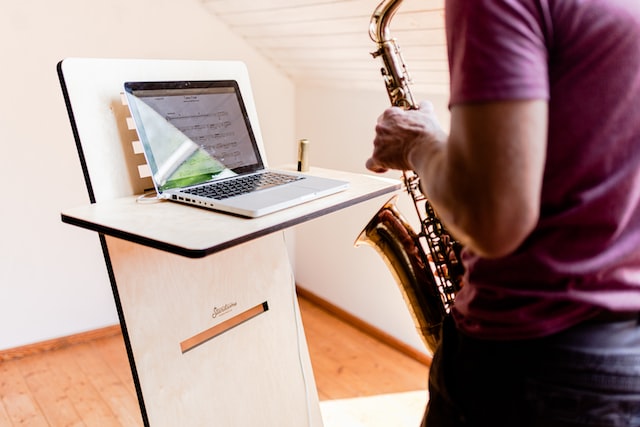Here’s summary how long it takes o practice the saxophone
Practicing your instrument is an essential part of learning it. But how long should you practice saxophone? If you’re a beginner, start with just 30-50minutes per day, and you should observe some advancement within the next six months. As you get more advanced and start to take lessons, the amount of time spent practicing will increase as well.
Mastering the saxophone is a dream come true for every saxophone player. This is because they know the effort and rock hard training that lie ahead. Looking at the saxophone and all that it entails, it’s common to have beginning saxophonists question how long they should practice the saxophone to get better. But here’s the good thing, “It’s achievable because you’ve set your mind to do it”. And no, definitely not as long as you think.
In this article, you will understand the importance of practicing and how long you should practice the saxophone to hone your skills. Enjoy!
How Long Should I Practice The Saxophone?
Indulging in the soothing activity of learning an instrument allows you to concentrate on a specific task for an extended amount of time, whether it’s learning a chord or studying the lyrics in front of you.
However, most individuals should be able to read simple rhythms with ease after a few years with a respectable level of practice hours and enthusiasm.
Decide on your end objective and make it achievable as your first step.
The first factor to look into is how much practice time per day are you willing to commit. or the time that works best for you, and be willing to stick to it no matter what. Before you can estimate how long it would finally take to learn the saxophone, you must devote yourself to a daily workout regimen.
Here’s The Strategy:
Start with just 30-50minutes per day, and you should observe some advancement within the next six months. Then, you might consider staying for longer training sessions to dig deep in, but don’t chastise yourself if you skip a couple of days from your daily routine of practice.
If you could average an hour or more for perfection although no one is perfect, daily for 1 to 2 years while getting proper guidance from a great coach, you should accomplish your objective.
- Beginners are suggested to practice for at least four to five days a week for at least 30 minutes each session. However, consistency is more fundamental than anything to do with, so you must keep practising every day to continue improving your playing.
How Long Does It Take To Play The Saxophone?
Learning how to play the saxophone properly should take anywhere from 6 to 12 months (1 year), depending on your level of commitment. This involves continuing to practise even after you have cut back or stopped playing the game regularly. Having said that, once you get going, you will not be able to stop.
The best method to get better is to practise every day; if you do so, you should be able to play songs within a few months at the latest, and certainly within a year.
Why Should I Devote To Saxophone Practice?
The saxophone is an orchestral musical instrument that allows you to engage in a diverse range of musical instrumentalists and performances.
Developing a new skill set that may necessitate some time to grasp but that you are positive will be worth the effort, in the end, inspires you to strive with practising because you perceive that the longer you practice, the stronger you will get.
Having realized that each training session builds on the preceding one and that you become a more excellent musician one cumulative step at a time would facilitate you to stay strong and train yourself to be calmer with yourself.
However, have you wondered how iffy one may sound after stepping away from practising for a while, it’s quite astounding how you cognitively recall the positions to play particular notes while playing with your hands.
Playing or practising music can also significantly affect your emotions, especially if you choose to perform a happy song or one of the top picks that never fails to make you grin.
Is The Instrument Worth The Stress Of Practice
Everyone that hears the saxophonist has the impression that what they are hearing is not just a finely sculpted lump of metal, but it details the expression of the player’s soul to the audience when played.
There is almost no musical genre in which the trusty old “trumpet-looking instrument” can’t provide enchanting moments ranging from blues, rock, funk, rock-‘n’-roll, soul, pop, and even in modern classics.
There are surely intriguing and technically innovative ways to produce sounds using the saxophone other than the popular ones. Although there are suggestions, the saxophone’s sound is frequently preferred unmodified and is one of the last genuine instruments of music to flourish in rock and funk concerts, as well as in pop or modern classics, in the era of sounds and instrumentation.
The saxophone was designed to strike a balance between brass and woodwind instruments, thus it is about more than sound. It is essential for obtaining musical harmony since it not only unifies the two variables’ conflicting tones but also complements both high and low reed instruments. This degree of adaptability allows it to be a prominent intermediary element in a full orchestra.
What You Should Know About The Saxophone Before Practicing
To play the saxophone, you must master a variety of skills. Having a good instrument is the first, being acquainted with where to place your fingers, understanding basic music composition, voicing for the saxophone, setting up the instrument in the right manner, obtaining an appropriate mouthpiece setup, basic time constraints, fluency, overall musical training, strategic planning.
And in addition, dedication to saxophone playing is also the most important of these skills to have because without it learning saxophone will be a struggle rather than fun and worthwhile.
Owing to its “groovy” aura, the saxophone has always been on people’s lists of instruments to perfect. There are several reasons for you to try to play, in addition to the evident respect that you will attract from your pals for your superb instrument preference.
Benefits of learning the saxophone
There are significant advantages to mastering an instrument, but did you realize that it can also boost or improve your scholastic competence in subjects like arithmetic and educational standards? Playing an instrument strengthens perceptual capabilities and the ability to discern various sounds, which facilitates language proficiency.
Furthermore, it elevates an individual’s capacity for analytical thinking, which is a central determinant for proficiency in academics.
Conclusion
The saxophone is a magnificent instrument to practice, which is the ultimate and most vital factor before considering learning to play it. With its broad range and soothing sound production, an instrument may be played with immense satisfaction and practically any passion can be portrayed acoustically. Why are you holding back for? Grab the saxophone and start practising.







